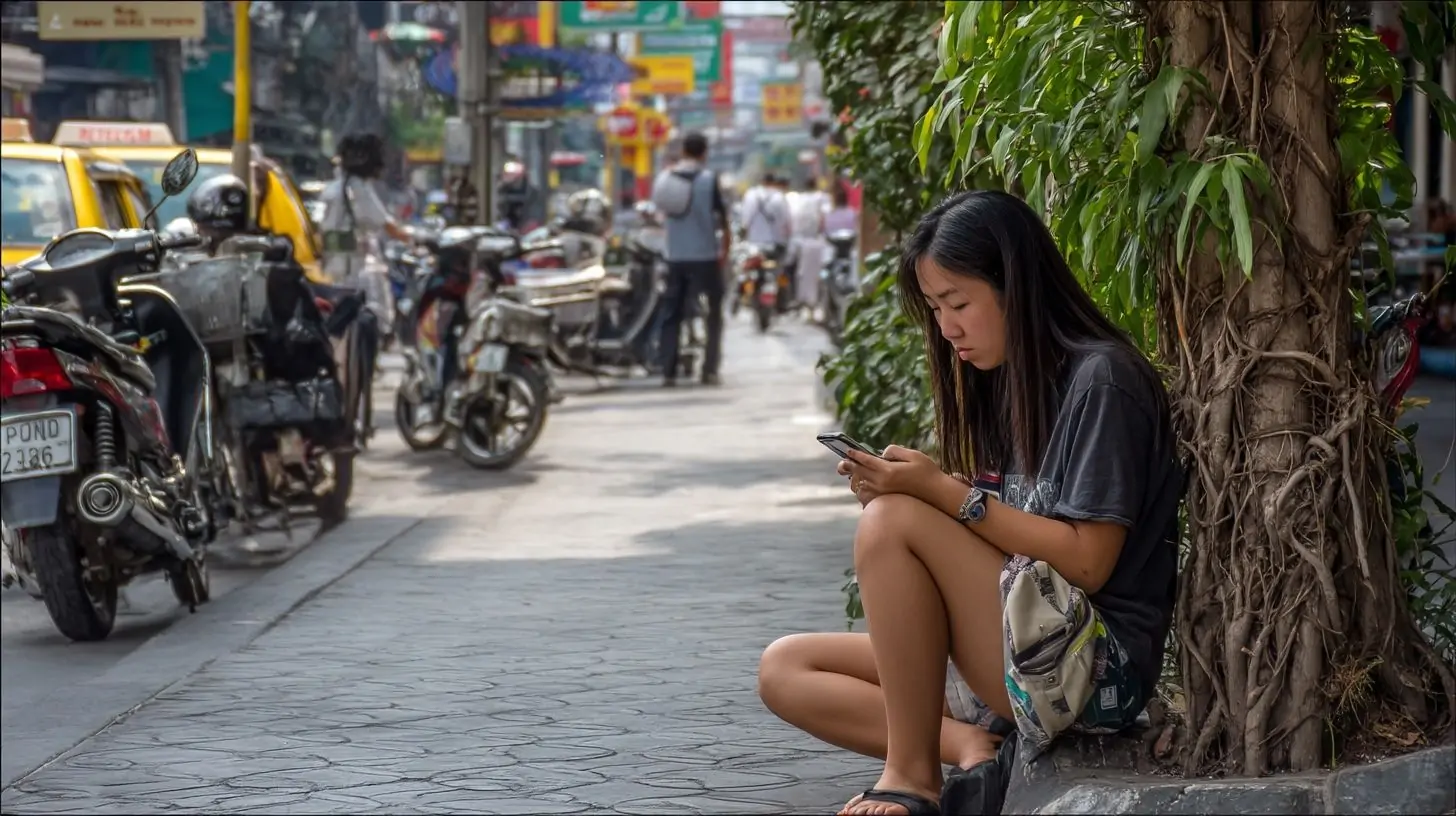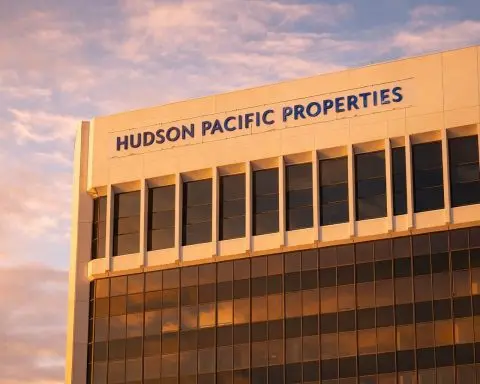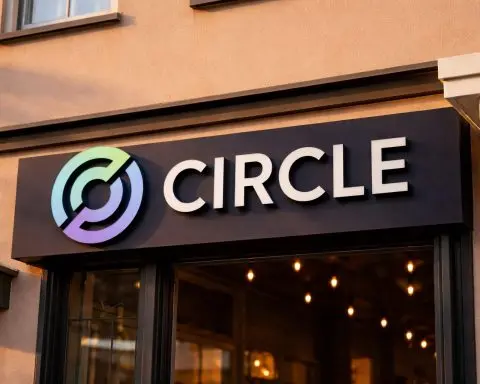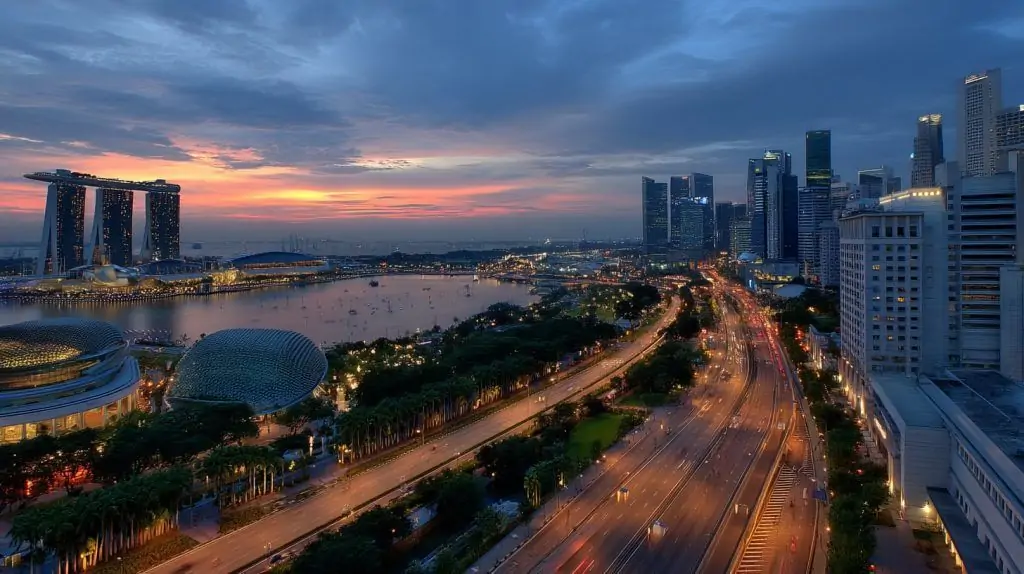- Bangkok’s connectivity is among Southeast Asia’s best, with Thailand ranking 13th globally for fixed broadband speeds in early 2025 at about 237 Mbps, driven by Bangkok’s dense fiber backbone and data centers.
- Bangkok was among the first Thai cities to deploy FTTH, making fiber the default home internet in urban areas with typical speeds from 100 Mbps to 1 Gbps and providers offering plans such as AIS Fibre 100 Mbps for 399 THB/month and 1 Gbps for 999 THB/month.
- 4G coverage is essentially universal in Bangkok and 5G began in 2020, with 5G in the city center typically around 100 Mbps and peak bursts much higher, while 4G speeds run 20–50 Mbps and latency can be 10–30 ms.
- AIS Fibre is a major provider and in late 2023 AIS acquired 3BB, integrating 3BB’s fiber network into AIS Fibre.
- TrueMove H merged with DTAC to form True Corporation in 2023, strengthening nationwide mobile and fixed broadband coverage, including 5G.
- Bangkok offers abundant public Wi‑Fi: free networks in airports, malls, cafés, and attractions; AIS “AIS SUPER WiFi” and True “TRUEWiFi” hotspots are common, often accessible by logging in with a phone number or email.
- Suburban Bangkok and metropolitan outskirts have strong fiber coverage as Net Pracharat expanded rural broadband, with areas like Nonthaburi, Bang Na, and Lat Phrao having multiple options, contributing to national fixed broadband growth from 12.8 million households in 2016 to 21.3 million in 2022.
- Satellite internet is not practically used in Bangkok; Starlink is not legally available in Thailand as of 2025, while OneWeb has been approved to offer satellite internet in Thailand, potentially for rural or enterprise use.
- Bangkok’s 5G expansion and smart city plans are advancing, including a government spectrum auction in 2020 (~$3 billion) and initiatives like smart street lighting with Wi‑Fi/sensor nodes and real-time traffic and flood monitoring.
- For tourists, getting online is easy: AIS Tourist SIMs offer 8 days with 15 GB for about 299 THB, 15 days with 30 GB for 599 THB, or 30 days with 50 GB for 899 THB; eSIMs are supported by all three operators, and many travelers also use pocket Wi‑Fi or local top-ups.
Overview of Internet Infrastructure in Bangkok
Bangkok boasts one of the most advanced internet infrastructures in Southeast Asia. Thailand’s internet penetration is high (around 85% as of 2021) and the country ranks among the top in the world for broadband speed en.wikipedia.org. In fact, by early 2025 Thailand held 13th place globally for fixed broadband download speeds (averaging ~237 Mbps) nationthailand.com – a level of performance largely driven by the robust networks in Bangkok. The city’s core is well-connected by extensive fiber-optic backbone links, multiple international internet gateways, and data centers, ensuring fast and reliable connectivity. In practical terms, internet access in Bangkok is ubiquitous – you typically won’t have to worry about finding a connection, as it’s “fast, stable, and everywhere” freakingnomads.com.
The capital has seen heavy investment in telecom infrastructure under national initiatives like Thailand 4.0. Fiber-to-the-home (FTTH) has expanded rapidly in Bangkok, with consumer broadband packages ranging from basic 10–100 Mbps plans up to gigabit-speed connections en.wikipedia.org en.wikipedia.org. Cellular networks are equally modern: 4G LTE is universally available and 5G services rolled out beginning in 2020 en.wikipedia.org. As a result, mobile internet speeds in Thailand average about 100 Mbps download (ranked 39th globally) nationthailand.com, with even higher performance on 5G in Bangkok’s city center. Overall, Bangkok’s internet ecosystem (spanning fixed broadband, mobile data, and public Wi-Fi) is highly developed and continues to improve, making the city a remote work paradise in terms of connectivity.
Fixed Broadband (Fiber) Availability and Quality
Fiber-optic broadband is widely available across Bangkok, delivering high speeds at affordable prices. Major broadband providers have deployed extensive fiber networks covering not just the downtown core but also most suburban districts. As a result, even residential connections commonly reach hundreds of Mbps – it’s not uncommon to have 300–500 Mbps Wi-Fi speeds at condos or even in cafes. Bangkok was among the first Thai cities to get FTTH, and today fiber is the standard for home internet in urban areas. Legacy ADSL or cable modem lines are largely being phased out in favor of fiber, except perhaps in a few older buildings. Consumer fiber plans are generally uncapped/unmetered, offering unlimited usage with reliable performance.
Typical fixed broadband speeds: Packages for home users range from ~100 Mbps up to 1000 Mbps (1 Gbps). For example, AIS Fibre (one of the top ISPs) offers entry-level plans of 100 Mbps download/upload for around 399 THB (~$13) per month, and premium plans up to 1000/200 Mbps for ~999 THB iglu.net iglu.net. Competing ISP 3BB (now integrated with AIS, see below) similarly provides gigabit plans, including 1 Gbps/1 Gbps symmetric fiber for about 1,200 THB (~$38) monthly iglu.net. TrueOnline, another major provider, advertises packages like 300/300 Mbps for ~399 THB and 1 Gbps/200 Mbps for ~899 THB iglu.net. These prices are remarkably low by global standards, which helps explain the high adoption of home broadband in Bangkok. According to data from late 2022, Thailand’s median fixed download speed was about 205 Mbps en.wikipedia.org, and by 2025 it climbed even higher – reflecting how Bangkok’s fiber uptake has pushed national averages into the global top tier.
Quality and reliability: Fiber broadband in Bangkok is generally very reliable and consistent. Connections are stable enough for HD streaming, video conferencing, and other heavy usage with minimal downtime. Many office buildings in business districts (e.g. Sukhumvit, Silom, Sathorn) are directly linked via fiber to the internet backbone en.wikipedia.org, ensuring enterprise-grade reliability for companies. For home users, ISPs usually provide Wi-Fi routers with dual-band support and even mesh Wi-Fi kits on higher-tier plans iglu.net, so indoor coverage is good. While occasional outages can occur (for example, due to local power cuts or cable maintenance), these are infrequent in central areas. Bangkok is also in the process of moving overhead telecom cables underground in many neighborhoods, which over time will improve reliability and city aesthetics. In summary, fixed broadband in Bangkok is fast, affordable, and dependable – a key reason why the city is known to have some of the “fastest and most reliable internet in the world” for remote workers.
Mobile Data Networks (4G and 5G Coverage)
Mobile internet in Bangkok is equally impressive, with extensive 4G LTE coverage and rapidly expanding 5G networks. All major Thai operators have deployed 5G in Bangkok, so most of the city now enjoys ultra-fast mobile data in addition to blanket 4G service. 4G speeds in Bangkok typically range from 20–50 Mbps in everyday use, with good signal even indoors and in transit. On 5G, users often see 100 Mbps or more on modern smartphones – indeed, with a 5G-capable device (and eSIM or SIM from a local carrier), you can often get around 100 Mbps in most areas of the city freakingnomads.com. Peak 5G speeds can go much higher (several hundred Mbps) under ideal conditions, for example near base stations or during off-peak network hours.
Coverage: Bangkok’s dense urban environment is well-served by thousands of cell sites. 4G coverage is essentially universal across the city and suburbs; you will rarely lose signal within the metropolitan area. 5G coverage, while still improving, is already available in all central districts and many outlying areas as of 2025. The main operators launched 5G in early 2020 and have aggressively expanded since en.wikipedia.org. Independent network reports show Thailand’s mobile networks have improved considerably – though Thailand’s average mobile download speed (~101 Mbps) ranks lower globally than its fixed broadband nationthailand.com, Bangkok is far ahead of rural areas, and the gap is closing as 5G rolls out. In fact, one analysis noted Thailand now has one of the most advanced 5G systems in Asia bangkokpost.com. Users in Bangkok benefit from this with speedy downloads and low latency on mobile, whether using 4G or 5G.
Real-world experience: For everyday tasks – Google Maps navigation, rideshare apps, social media, email, video calls – 4G is more than sufficient citywide. 5G shines for data-heavy tasks like 4K video streaming, large file transfers, or as a backup for home internet. Even on public transit (BTS Skytrain or MRT), you’ll generally have a usable 4G/5G signal throughout most of the route. The reliability of mobile data is high; call drops and dead zones are uncommon in the capital. However, as with any city, mobile speeds can dip in extremely crowded areas or during peak usage times. Overall, Bangkok’s mobile connectivity is robust enough to be a primary internet source if needed – many digital nomads simply tether their laptop to a 5G phone connection and get broadband-like performance on the go.
Major Internet Service Providers (ISP) in Bangkok
Bangkok’s internet services are provided by a mix of private telecom companies and a state operator. Here are the major players for both fixed broadband and mobile data:
- AIS (Advanced Info Service): Thailand’s largest telecom operator. AIS operates the AIS Fibre broadband service and is also the top mobile provider (with AIS 5G/4G networks). AIS Fibre offers pure fiber plans up to 1 Gbps iglu.net. In late 2023, AIS acquired the broadband ISP 3BB to expand its fixed-line coverage nationthailand.com. On mobile, AIS has a reputation for excellent coverage and speed – it consistently wins speed awards (e.g. highest 5G download rates around 69 Mbps on average) opensignal.com. AIS is often the go-to choice for both home internet and SIM cards due to its quality of service.
- True Corporation (True Move H / TrueOnline): True is a major conglomerate providing both mobile and fixed internet. TrueOnline is a leading broadband ISP with nationwide fiber (up to 1 Gbps plans) iglu.net iglu.net. TrueMove H is the mobile arm, historically the second-largest mobile operator. In 2022, True’s telecom division merged with DTAC, another mobile carrier, forming a combined entity under the True brand. This merger created a stronger competitor to AIS. True’s networks (including former DTAC sites) cover Bangkok thoroughly, and TrueMove H offers 5G, 4G, and an extensive network of Wi-Fi hotspots in the city. TrueOnline broadband is known for competitive pricing and often bundles extras like Wi-Fi mesh routers and TV service.
- DTAC (Total Access Communication): DTAC was one of the “big three” mobile providers alongside AIS and TrueMove. Following the merger, DTAC and TrueMove H are now under the same umbrella (True Corporation) as of 2023–24. The DTAC brand may still be seen, but network resources are being integrated with True’s. DTAC historically had a strong 4G network and popular tourist SIM deals (Happy Tourist SIM). Now as part of True, customers benefit from combined network coverage. In summary, the dominant mobile operators in Bangkok are effectively AIS and True/DTAC – with AIS slightly ahead in market share and performance, and True/DTAC jointly in a close second iglu.net.
- 3BB: Formerly a standalone ISP (Triple T Broadband), 3BB has provided fiber and DSL internet in Thailand for many years with wide coverage, especially in residential areas. 3BB’s fiber plans include low-cost gigabit options(e.g. 1 Gbps/500 Mbps for ~700 THB) iglu.net. In Bangkok, 3BB has a significant user base. As noted, AIS acquired 3BB in late 2023 nationthailand.com, so going forward 3BB services are being integrated into AIS’s portfolio. Existing 3BB customers in Bangkok continue to receive service (now backed by AIS’s resources), and new customers can likely subscribe via AIS Fibre channels.
- NT (National Telecom): NT is the state-run telecom operator, formed by the merger of TOT and CAT Telecom. NT provides some fixed broadband (including fiber in certain areas and older ADSL lines) and also operates a mobile network. NT’s mobile service (on 4G/5G) is relatively small in market share compared to AIS and True, but it exists as an alternative, often focusing on government or rural projects. NT also manages infrastructure like international gateways and some city Wi-Fi hotspots. For most consumers and travelers in Bangkok, NT isn’t the first choice, but it plays a background role (for example, partnering to deploy connectivity in public facilities and partnering with satellite providers).
Other providers: A few niche ISPs and MVNOs operate in Bangkok as well – for instance, local fiber companies (like Sinet or AIS-owned "Next by AIS" in some condos) and mobile virtual operators – but their impact is limited. The vast majority of users will interact with one of the big providers above for internet access.
Public Wi-Fi Networks and Hotspots
Bangkok offers plentiful public Wi-Fi options. Free Wi-Fi is commonly found in many public spaces, cafés, restaurants, shopping malls, and tourist attractions airportels.asia. Virtually every coffee shop chain (e.g. Starbucks, Café Amazon, True Coffee) provides free Wi-Fi to customers. You’ll typically see a Wi-Fi network name and need to ask staff for the password (or sometimes the receipt has login details). These networks are generally high-speed – it’s normal to be able to get work done on coffee shop Wi-Fi. In fact, many large cafes and co-working cafés in Bangkok pride themselves on reliable internet for patrons, often with fiber backhauls. According to one digital nomad resource, the city has dozens of “laptop-friendly” venues with free and reliable Wi-Fi, ample power sockets, and comfortable seating laptopfriendly.co, making it easy to work or browse from virtually anywhere.
Beyond cafés, major shopping centers and public venues provide Wi-Fi. All the large malls (e.g. Siam Paragon, Central World, IconSiam) have their own free Wi-Fi networks – usually you register with an email or phone number to get access for a couple of hours. Similarly, Bangkok’s airports (Suvarnabhumi BKK and Don Mueang DMK) offer free Wi-Fi for passengers (with a registration portal). Even BTS Skytrain and MRT stations have free Wi-Fi signals in many cases. Tourist landmarks such as the Grand Palace, Khao San Road, and Chatuchak Market have deployed free Wi-Fi hotspots as part of city initiatives airportels.asia. In these outdoor public areas, the Wi-Fi is provided by government or telecom sponsors and may require a quick sign-up (often asking for your name, email or passport number) airportels.asia. The speed on public networks can vary – in crowded areas it may be slow – but it’s sufficient for basic needs.
Additionally, the telecom operators run extensive Wi-Fi hotspot networks throughout Bangkok. AIS, TrueMove (and formerly DTAC), and even NT all have thousands of Wi-Fi access points. For example, AIS has “AIS SUPER WiFi” hotspots and True has “TRUEWiFi” – commonly found in malls, convenience stores, hospitals, and around city centers. If you are a subscriber of their mobile or broadband service, you often get free access to these Wi-Fi hotspots by logging in with your phone number. Non-subscribers might see these networks but need to pay or won’t have credentials. According to a travel tech guide, all the major mobile operators (AIS, True/DTAC, and TOT/NT) provide public Wi-Fi services in many areas of Bangkok airportels.asia. So if you have any local SIM, you likely can hop onto an operator’s hotspot for faster speeds or to save your mobile data.
Co-working spaces: Bangkok has a thriving co-working scene which offers another form of internet access for the public (albeit paid). Dozens of co-working spaces (The Hive, WeWork, Hubba, Regus, True Digital Park, and many independent ones) are scattered across the city. These spaces provide professional work environments with very high-speed internet (often fiber lines with backup lines), along with desks, meeting rooms, and other amenities. Many co-working sites allow drop-in use or day passes ranging roughly from 200 to 500 THB per day. Remote workers who need guaranteed stability or higher upload speeds (for example, content creators or those doing live broadcasts) often use co-working facilities. Generally, the Wi-Fi at co-working spaces is excellent – speeds of 100 Mbps+ are common and the connections are secure. For instance, one reviewer noted a Bangkok co-working space offering ~99 Mbps download / 20 Mbps upload on a day pass, which was sufficient for heavy work tasks. If you’re staying long-term, monthly memberships are also available. In short, co-working spaces are a good backup or primary option for reliable internet and a work-friendly atmosphere.
Security tip: While using public Wi-Fi, be mindful of security. Many networks in Bangkok are open or use shared passwords, so it’s wise to avoid transmitting sensitive information without protection. Consider using a VPN when on public hotspots, or stick to your mobile data for banking and other secure transactions. Overall, though, Bangkok’s public internet access infrastructure is very foreigner-friendly – you’ll rarely be offline, as there is always some Wi-Fi network around the corner or a strong cellular data signal to fall back on.
Internet Access in Suburban and Outer Bangkok
Bangkok’s metropolitan area is vast, extending into suburban districts and neighboring provinces. The good news is that internet coverage remains strong even outside the city center. Fiber broadband has been rolled out not only in downtown neighborhoods but also in most suburban communities, especially those with housing estates or apartments. For instance, areas like Nonthaburi, Bang Na, Lat Phrao, etc., which are outside the main business center, still typically have multiple fiber ISP options. The Thai government’s rural broadband program (Net Pracharat) also helped extend high-speed internet to many previously underserved areas. As a result, the reach of fiber and wireless broadband has grown tremendously – one report noted Thailand’s focus on fixed broadband has increased subscriptions from 12.8 million households in 2016 to 21.3 million in 2022 pulse.internetsociety.org, indicating that suburban uptake was a big part of that growth.
In practical terms, if you’re staying in the outskirts of Bangkok, you can still expect reliable internet, though top speeds might be slightly lower than in a new condo in Sukhumvit. Some far-edge communities might only have one fiber provider available (rather than the choice of 3-4 in the city center). In a few semi-rural pockets just beyond Bangkok, fixed lines could still be DSL or fixed wireless rather than true fiber. However, those cases are increasingly rare as fiber rollout continues. Importantly, cellular coverage is nationwide – so even if a fixed line is less available in a given suburb, 4G/5G mobile data will work as a substitute. Every populated area of Bangkok and its environs has at least 4G signal from the big carriers. So remote villages or industrial areas on Bangkok’s fringe remain connected via mobile broadband if nothing else.
To summarize, urban and suburban Bangkok are well covered by high-speed networks – it’s primarily areas beyondthe suburbs (deep rural regions in other provinces) where Thailand’s fiber infrastructure hasn’t fully reached pulse.internetsociety.org. Within greater Bangkok, the difference you might notice in outer districts is potentially a bit more congestion at peak times, or fewer public Wi-Fi hotspots compared to downtown. But overall, one can live in a suburban district of Bangkok and still enjoy streaming 4K video, joining Zoom meetings, and other high-bandwidth activities without issue. Just be sure to check with your landlord or accommodation – most will already have fiber internet installed. If not, arranging a new broadband installation in Bangkok is usually fast and inexpensive, even in the suburbs (often done within a few days).
Satellite Internet Availability in Bangkok
Given Bangkok’s excellent ground-based networks, satellite internet is generally not used nor needed by the average user in the city. Satellite internet services (such as VSAT links via Thaicom satellites) do exist in Thailand, but these have traditionally been targeted at remote rural areas or islands where terrestrial infrastructure was lacking. In a dense urban environment like Bangkok – loaded with fiber optics and cell towers – satellite connectivity is largely irrelevant for day-to-day internet access.
It’s worth noting that SpaceX’s Starlink satellite internet is not legally available in Thailand as of 2025. The regulator (NBTC) has not yet licensed Starlink, and authorities have even cracked down on illicit use of Starlink equipment that was being smuggled in asianwirelesscomms.com. A recent incident saw Thai border police seize Starlink kits that scam gangs were using in remote border areas to evade law enforcement asianwirelesscomms.com asianwirelesscomms.com. So for now, Starlink cannot be officially bought or operated in Thailand. On the horizon, however, another low-earth-orbit provider OneWeb (through a partnership with state-owned NT) has been approved to offer satellite internet service in Thailand asianwirelesscomms.com. This could bring satellite broadband options to the country in the coming years (OneWeb’s focus might also be on rural connectivity or enterprise services).
For a traveler or resident in Bangkok, satellite internet is not a practical consideration. Even if Starlink were to launch, it requires a clear view of the sky and isn’t portable for mobile use – and given Bangkok’s high-rise buildings and ubiquitous fiber, there’s little incentive to use a latency-prone satellite link. The only scenarios where satellite might be relevant in the city are niche cases (e.g. as a backup for critical infrastructure or in disaster recovery if terrestrial networks went down). Otherwise, you will rely on the ground networks, which are far superior in speed and latency. In summary, satellite internet plays virtually no role in Bangkok’s everyday connectivity landscape – it’s an urban environment firmly served by fiber broadband and cellular data networks.
Typical Internet Speeds and Reliability
Speed: Bangkok’s internet speeds are impressive across all connection types. On fixed home broadband, users frequently experience hundreds of megabits per second. The median fixed download speed in Thailand was measured around 205–237 Mbps in 2022–2025 en.wikipedia.org nationthailand.com, and in prime Bangkok locations speeds can be higher still (especially with gigabit plans). Many home Wi-Fi networks in condos operate at 300 Mbps or above, and some cafés report 500 Mbps Wi-Fi being “not uncommon”. Upload speeds on fiber are often 100 Mbps or more, which is great for cloud backups, streaming, and video calls.
Mobile speeds are a step below wired, but still very good. With 4G, you can expect roughly 10–50 Mbps in normal conditions (enough for HD video streaming and smooth browsing). With 5G, real-world speeds of 50–150 Mbps are common, and higher bursts are possible. Thailand’s average mobile download was about 101 Mbps in early 2025 nationthailand.com, reflecting the mix of 5G and 4G usage. In downtown Bangkok with strong 5G signal, users often report 100+ Mbps downloads on phones freakingnomads.com. Ping (latency) on 4G is usually ~20–30 ms, and on 5G can be as low as ~10 ms – suitable for gaming or any real-time application. It’s also worth noting the consistency: a large majority of Bangkok mobile users can stream video and make VoIP calls without buffering; all Thai operators fall in “Very Good” categories for video streaming experience on 4G/5G opensignal.com.
Reliability: Internet connectivity in Bangkok is highly reliable in general. The city’s telecom infrastructure has redundancy and has handled surges in demand (for instance, during the 2020 pandemic lockdowns, Thailand’s networks scaled up and even improved their global speed rankings bangkokpost.com). For fixed broadband, outages are rare and usually quickly resolved. Many ISPs have service centers and hotlines with 24/7 support in the city. Power outages in central Bangkok are infrequent, meaning your home router will normally stay powered. (In case of power loss, mobile networks often have battery backup at towers, so your phone data might still work for a few hours.)
Mobile networks have good uptime; you won’t often find yourself without signal or experiencing network-wide downtime. Congestion can occasionally slow things during big events or in very crowded districts, but outright service drops are uncommon. Rainstorms – Bangkok’s heavy monsoon rains – generally do not affect fiber (since it’s mostly underground or weatherproof) or mobile (cell sites are built to handle rain, though extremely heavy rain can attenuate signals slightly). Overall, Bangkok’s internet is considered reliable enough for business use, remote work, and critical communications. It’s not an exaggeration when expats say “you don’t have to think about internet access in Bangkok” because it’s usually fast and stable whenever you need it freakingnomads.com.
Of course, reliability can vary by individual provider and location. Some expats note that certain condo buildings might have outdated internal wiring or a less popular ISP, resulting in slower evenings or occasional router resets. But these are exceptions rather than the rule. By and large, Bangkok’s internet gives a consistent experience: high bandwidth, low latency, and 24/7 connectivity. If 100% uptime is essential (for example, you cannot afford even a minute offline during a critical work task), the best practice is to have both a fixed line and a mobile data plan as backup. Many remote workers in Bangkok do this – using home Wi-Fi primarily, but tethering to 4G/5G on their phone if the Wi-Fi hiccups. Given the low cost of mobile data, it’s an easy redundancy measure iglu.net.
Internet Options and Packages for Tourists
Visiting Bangkok and need internet? You’re in luck – Thailand is one of the most tourist-friendly countries when it comes to connectivity. Short-term visitors have several convenient options:
- Local Prepaid SIM Cards: The most popular solution is to buy a Thai prepaid SIM (from AIS, TrueMove, or DTAC) which comes with a bundle of data for your stay. At Bangkok’s airports, you’ll find booths for AIS, True, and DTAC selling “tourist SIM” packages. For example, AIS offers an 8-day Tourist SIM with 15 GB of high-speed data plus some call credit for around 299 THB (~$9) thailandesim.com. DTAC (now part of True) has a similar Happy Tourist SIM – 8 days with 15 GB for 299 THB and a 15-day with 30 GB for 599 THB* dtac.co.th dtac.co.th. Common tourist SIM plans include free use of social media apps (Line, Facebook, WhatsApp, etc. don’t count against your data) thailandesim.com and some free minutes for local calls. The SIMs are often plug-and-play – the staff will activate it and set it up in your phone, and you’re online as soon as you land.
- eSIM for Thailand: If your phone supports eSIM, you can even arrange your data plan before arriving. Thai operators now allow tourists to purchase eSIM packages online (AIS, for instance, sells eSIM packages ranging from 8 days/25 GB up to 30 days/unlimited) thailandesim.com. There are also global eSIM providers (like Airalo, Sim2Fly, etc.) that offer Thailand data plans. These can be very cost-effective – one travel blogger notes you can get an eSIM with unlimited data for 10 days for under $10 USD traveltomtom.net. Activating is as simple as scanning a QR code. As of 2025, all three main mobile operators support tourist eSIMs, making it an attractive option for those who don’t want to swap physical SIM cards traveltomtom.net.
- Pocket Wi-Fi (Portable Hotspots): Another option is renting a portable Wi-Fi router (often called “pocket Wi-Fi”). Services like AIRNET airportels.asia or rental counters at the airport offer small battery-powered routers that come with a data SIM installed. You carry the device with you and it creates a private Wi-Fi network for your phone/laptop. This is useful for groups (so multiple devices can share one data plan) or for devices that can’t use local SIMs. Rental costs can be around 100–200 THB per day, and typically they offer unlimited data. The downside is carrying an extra device and keeping it charged. Given how cheap regular SIM plans are in Thailand, pocket Wi-Fi has become a bit less popular, but it’s still available for those who prefer it.
- International Roaming: You could use your home carrier’s roaming in Thailand, but beware of high fees. Most travelers find it far cheaper to use a local SIM or eSIM. Some neighboring countries’ SIMs (e.g. a Singapore or Malaysia tourist SIM) might include roaming in Thailand, but generally buying a Thailand-specific plan is easiest.
Buying a SIM – where and how: If not obtained at the airport, you can buy local SIM cards at countless stores in the city. Official mobile operator shops (found in every mall) are recommended – staff there speak English and will register and activate your SIM properly traveltomtom.net traveltomtom.net. Convenience stores like 7-Eleven also sell SIM packs, but the activation can be tricky if there’s a language barrier, so it’s better to go to a telecom shop for a hassle-free experience traveltomtom.net traveltomtom.net. Remember to bring your passport, as by law you must register your SIM with your ID (this will be done at point of sale – they’ll take a quick copy or photo of your passport) traveltomtom.net. The whole process only takes a few minutes.
Costs and data allowances: Tourist SIM deals are very generous due to competition. As summarized by TravelTomTom, a typical offering is around 299 THB for 8 days with ~15 GB, 599 THB for 15 days with ~30 GB, or 899 THB for 30 days with ~50 GB traveltomtom.net. Some packages even advertise “unlimited” data – usually this means a large high-speed allotment (e.g. 15 GB) after which you can still use data at a throttled speed (128–384 kbps) for the remainder of the period. For most tourists, 15–30 GB is effectively unlimited for a short trip, considering you likely have Wi-Fi at hotels and cafes too.
SIM card sizes and compatibility: All SIMs nowadays are sold as tri-cut (Standard/Micro/Nano), and eSIM covers phones without SIM slots. Thailand uses standard GSM/LTE/NR technology on common bands, so any unlocked international phone will work. 5G access is included at no extra charge in tourist SIMs, provided your device supports the necessary bands (most recent phones do).
For long-term visitors: If you’re staying a few months, you can continue with prepaid by topping up and buying monthly data bundles, or you might consider a local postpaid plan if you have a long-term visa. Prepaid is very flexible – packages for locals offer deals like unlimited data for 30 days at various speed caps (for instance, ~300 THB for “unlimited 4G at 10 Mbps” or ~600 THB for “unlimited max-speed data” for a month). As a foreigner, you can use those too once your tourist bundle expires – just ask the operator or use their app to subscribe to a new package. Also note: you can have multiple SIMs – some digital nomads carry an AIS and a True SIM to ensure they always have the best signal on the go. However, in Bangkok city, sticking to one is usually fine as coverage is universal.
In short, for tourists, getting internet in Bangkok is easy, cheap, and fast. The recommendation is to get a local SIM or eSIM as soon as you arrive (if not earlier), rather than rely on expensive roaming. For under $10 you’ll be set with high-speed connectivity for a week or two – truly a bargain for peace of mind while traveling.
Pricing Comparison of Internet Access Methods
To help compare the different ways you can get online in Bangkok, here’s a breakdown of typical costs and what you get with each option:
| Access Method | Typical Cost | Details & Notes |
|---|---|---|
| Home Fiber Broadband | ฿400/month for 100 Mbps;<br>฿800–1200/month for 1 Gbps iglu.net iglu.net | Unlimited usage, generally includes Wi-Fi router. Requires installation at a fixed address (often included in apartment rentals). Best speeds and reliability for heavy use. |
| Mobile Data (SIM/eSIM) | Tourist SIM: ฿299 (8 days ~15 GB) traveltomtom.net; ฿599 (15 days ~30 GB) traveltomtom.net. Local Monthly: ~฿150–300 for limited plans; ~฿600+ for unlimited. | Instant connectivity everywhere in the city via 4G/5G. Great for short-term use and on-the-go access. Speeds typically 20–100 Mbps. Can serve as backup for home internet. |
| Public Wi-Fi | Free at many cafes, malls, airports airportels.asia; or ฿0–100 for paid hotspots. | Widely available in cafes (just buy a coffee), restaurants, and public areas. Quality varies but often quite good. Login may be required (e.g. email or SMS verification). Good for casual use; use VPN for security on open networks. |
Note: ฿ (Thai Baht) 100 ≈ USD $3 (as of 2025). Mobile data prices can fluctuate with promotions; many locals take advantage of special top-up bonuses and social media freebies included in plans thailandesim.com thailandesim.com. Overall, internet access in Thailand is very affordable relative to Western countries – even the top-tier 1 Gbps home package (~฿1000 or $30/month) is a fraction of the cost paid in many other nations for similar speeds.
Recommendations for Tourists and Remote Workers
1. Get a local SIM card or eSIM immediately. For any traveler or digital nomad, a Thai SIM is indispensable – it gives you maps, ride-hailing, messaging, and internet from the moment you land. As discussed, AIS, True, and DTAC all have excellent tourist packages; you can’t go too wrong with any of them since coverage is solid across Bangkok. AIS is often considered #1 for speed, but True/DTAC is very comparable in the city. If you want to be extra sure of connectivity, having two SIMs (from two different networks) can cover any blind spots (though in Bangkok proper, that’s rarely an issue). ESIMs are a great modern choice to save the hassle of swapping physical cards traveltomtom.net. Plan your data needs and choose a package accordingly – e.g. 15 GB for a week is plenty for most, but if you plan to stream a lot or work heavily on the go, you might opt for a larger 30–50 GB plan or an unlimited daily package.
2. Choose accommodation with good internet. If you’re a remote worker, ensure your hotel or apartment in Bangkok provides free Wi-Fi (almost all do) and ideally has a fiber connection. Most condos and hotels advertise “high-speed internet” – in a modern building this often means a true fiber line with 100 Mbps or more. It’s a good idea to read recent reviews or ask the host specifically about Wi-Fi speed and stability. Many Airbnbs in Bangkok list their Wi-Fi speed in the description now. If you end up in a place with subpar Wi-Fi, you can either rely on your own mobile data (since 4G/5G can handle work needs in a pinch) or pick up a short-term broadband plan. For long stays in a rented apartment, you could even have AIS or True come install a private line – they often run monthly contracts or even prepaid 1-month service for foreigners, and the cost is modest (~฿500-฿800). But usually, this isn’t necessary given the prevalence of decent included Wi-Fi.
3. Utilize co-working spaces and cafes strategically. Bangkok has countless work-friendly cafés and co-working venues freakingnomads.com freakingnomads.com. If you need a change of scenery or more reliable power/internet than your apartment, head to one of these spots. Co-working spaces are ideal for all-day work, important meetings (they have quiet rooms), or networking with other professionals. Many offer free trial days or community events – a good way to meet fellow nomads. For a more casual setting, big cafes (Starbucks, True Coffee, etc.) are dependable – they have AC, outlets, and decent Wi-Fi freakingnomads.com. A tip is to go early if you need a seat, as popular cafes can fill up with students and remote workers by mid-day. Also, some malls have public “digital lounges” or libraries with Wi-Fi (e.g. the Open House in Central Embassy mall is a known free workspace freakingnomads.com). Having these third-space options is great in Bangkok; use them if home or hotel internet ever falters or if you just want a productive environment.
4. Keep a mobile data backup for reliability. Even if you’re primarily using home or cafe Wi-Fi, it’s wise to have a backup internet source. The simplest is your smartphone’s data plan – ensure tethering is enabled and you have enough data. That way, if Wi-Fi drops, you can instantly switch your laptop to your phone’s hotspot and continue working uninterrupted iglu.net. Given the low cost of unlimited mobile packages, this redundancy is affordable insurance. For mission-critical online work (like live broadcasting, important conference calls), some remote workers in Bangkok even use two connections simultaneously (one primary, one failover). But for most, just knowing you can tether to 5G if needed is peace of mind.
5. Be mindful of SIM registration and expiring plans. Remember that tourist SIMs have fixed validity (5, 8, 15 days etc.). If your stay is longer, you may need to top up or purchase a new package/SIM when the initial one expires. It’s easy to do – you can refill online with a credit card or at any 7-Eleven. The SIM itself will usually remain active for a certain period (often 30-90 days) after your data package is used up, so you can extend it. For long-term visitors, consider switching to a normal prepaid plan after the tourist perks end, since the per-month rates can be cheaper that way. Also, keep your SIM card in a safe place if you swap it out – Thai SIMs are small but important (losing it means losing your number and remaining data).
6. Security and censorship notes: Thailand’s internet is mostly open, but some websites may be geo-restricted or censored (e.g. certain adult sites, or content critical of the monarchy). If access to any site is crucial, have a VPN ready. Using a VPN in Thailand is legal and common among expats. Also, as mentioned, use a VPN on public Wi-Fi for security. Lastly, familiarize yourself with basic Thai telecom etiquette: you will get promotional SMSs when you use a Thai SIM – they’re usually in Thai, but you can ignore them or ask a local to help unsubscribe if they bother you. Spam calls are not too frequent, but you might get the occasional ad call; just be prepared to decline unknown numbers.
In summary, Bangkok is extremely accommodating for those who need reliable internet. A combination of a local SIM, good accommodation Wi-Fi, and the abundance of free hotspots will keep you online 24/7. Many digital nomads agree that Bangkok’s connectivity is one of the best in the region for remote work – “you won’t have to think about internet access” because it just works freakingnomads.com. With a little preparation (SIM purchase, maybe a VPN subscription), you can seamlessly stay connected for work, travel planning, and keeping in touch with home.
Future Infrastructure Developments (5G Expansion and Smart City Plans)
Bangkok’s internet landscape continues to evolve rapidly, with significant upgrades on the horizon:
- 5G network expansion and upgrades: After the initial 5G launch in 2020, operators have been expanding coverage and increasing capacity. The Thai government auctioned spectrum (in 2020) raising over $3 billion, underscoring the commitment to 5G as critical infrastructure bangkokpost.com. We can expect even broader 5G availability, including in more indoor locations like malls and maybe the underground MRT. Telecom companies are deploying advanced technologies (like 5G standalone networks, network slicing for enterprises, etc.) to improve speeds and reliability further. Thailand’s 5G is already quite advanced (Huawei even highlighted it as “the most advanced 5G in Asia” in some respects bangkokpost.com), so the future will likely bring Gigabit-class mobile speeds more consistently across Bangkok. This could enable new services like VR/AR experiences for tourism and even more people using 5G for home internet via fixed-wireless access.
- Smart City initiatives: Bangkok is actively pursuing smart city status. The city’s administration, under Governor Chadchart (as of 2024), has launched programs focusing on smart infrastructure, IoT, and public Wi-Fi. One concrete project is upgrading street lighting to use Wi-Fi-enabled smart light bulbs that can double as network nodes and IoT sensors thepattayanews.com. These smart lights will help create a mesh of connectivity for city services (and possibly provide free Wi-Fi in more public streets). The government is also installing environmental sensors, smart traffic systems, and CCTV cameras connected via city Wi-Fi/5G networks to improve urban management bangkokpost.com. For example, plans include real-time traffic monitoring and flood detection systems that rely on internet-connected devices sending data live to control centers. All of this requires robust wireless and fiber links across Bangkok, which are being built out as part of the smart city roadmap.
- Free citywide Wi-Fi expansions: While many hotspots exist, Bangkok may see more coordinated free Wi-Fi zones. There have been discussions about offering free Wi-Fi in all public parks and on public transport. Some trials have already happened (e.g. Wi-Fi on certain BTS stations). With smart city funding, the coverage of free internet access in public spaces is expected to increase, bridging digital access for those who can’t afford mobile data and providing convenience for all. Even other cities in Thailand, like Pattaya and Phuket, are implementing citywide Wi-Fi as part of smart city projects e.huawei.com bangkokbankinnohub.com, so Bangkok is likely to follow or lead with similar efforts.
- Infrastructure consolidation and resilience: Another trend is the integration of networks – the merger of True and DTAC means network sharing and consolidation of cell towers, which could improve coverage density and reduce redundant infrastructure. AIS’s acquisition of 3BB means stronger investment in fiber to more homes. The government also floated the idea of a National Broadband Network company to oversee fiber backbone infrastructure bangkokpost.com, which could mean more efficient expansion of fiber in the future. Additionally, as mentioned, relocating cables underground is ongoing – improving storm resilience and aesthetics. All these moves aim to create a more resilient internet ecosystem in Bangkok that can handle growing demand.
- Satellite and alternative tech: In coming years, if services like OneWeb do become active, Thailand might incorporate satellite internet for disaster recovery or to connect outer communities (not so much Bangkok itself, but it adds to the national resilience which indirectly benefits the capital). There’s also interest in new technologies like Wi-Fi 6 and 6E deployments, and eventually 6G mobile networks (probably not until ~2030). For now, 5G and fiber will remain the backbone.
- Digital economy and services: With better internet, Bangkok is implementing more “smart city” digital services. For example, cashless payments via QR code are ubiquitous now – enabled by reliable mobile internet everywhere. The city may introduce apps for integrated transport info, virtual tourism, etc., which all require network capacity. The Thailand Smart City initiative aims to have dozens of smart cities nationwide bangkokpost.com, and Bangkok as the capital is central to that vision. Expect more government e-services, public safety systems, and possibly things like smart kiosks and digital signage that provide real-time information to citizens and tourists (all connected to the internet).
In essence, Bangkok’s already strong internet infrastructure is on track to get even better. 5G will become more entrenched, delivering faster and more uniform mobile data. Public connectivity will broaden, with more free Wi-Fi and IoT-driven services enhancing daily life (from smoother traffic to safer streets). The city recognizes that connectivity is key to economic growth and quality of life, so both public and private sectors are heavily invested in these improvements. For anyone planning to visit or work remotely from Bangkok, the trajectory is reassuring: the internet will only get faster, more accessible, and more innovative in its uses going forward. Bangkok is set to maintain its reputation as a top-tier connected city in Asia, blending ultramodern infrastructure with the vibrancy of Thai urban life.
Sources: The information in this report is based on up-to-date data and reports on Thailand’s internet connectivity. Key references include telecom news from The Nation Thailand nationthailand.com, industry analyses (e.g. Internet Society’s assessment of Thailand’s broadband expansion pulse.internetsociety.org), and traveler-oriented resources that reflect on-ground experiences (such as digital nomad guides freakingnomads.com and travel tech blogs traveltomtom.net traveltomtom.net). These sources have been cited throughout the text for verification and further reading.









